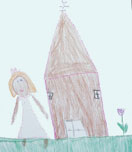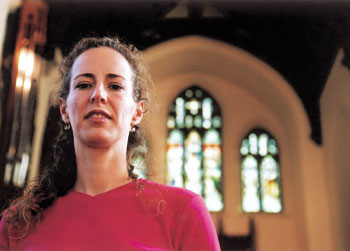

A publication of The Graduate School, University of North Carolina at Chapel Hill
Archives Fall 2002
Home | Back issues | About us | Email your feedback | The Graduate School | UNC-Chapel Hill | Make a gift
|
 |
Drawing
courtesy of Susan Bales
|
Susan
Ridgely Bales’ graduate research on children’s religious experiences
began with a dress.
While taking a
course on women and religion at Princeton University, Bales studied young
girls’ first communion dresses — white, lacy creations many
Catholic girls wear the day they participate in communion for the first
time. “I wondered why people dressed little girls up like brides
for this event,” Bales said. “I’m not Catholic, but most
everyone I knew growing up near Philadelphia was. I wanted to understand
more about mass, and I was interested in material culture, so I started
reading about it.”
In the course
of her exploration of communion dresses, Bales learned that academia had
produced almost no scholarship on what children think of their first communion
or other religious experiences. “Kids have been virtually ignored
in religious studies, as have older people,” she said.
Bales’ first-communion
research grew beyond dresses and evolved into a broader interest in children’s
religious experiences, which led her to the graduate program in the Department
of Religious Studies at UNC-Chapel Hill. “UNC was a perfect fit for
me,” Bales said. “The faculty and their openness to work with
other departments, like the anthropology department, are great. UNC also
has good relationships with religious communities in the area.”
Bales wrote her
ethnographic master’s thesis on children at Holy Cross Catholic Church
in Durham, a predominantly African-American congregation. She attended
church activities once or twice a week, including masses, retreats and
faith-formation classes, and interviewed nine children before and after
their first communion. “I was trying to interpret what they thought
about what they were learning in their first communion classes,”
Bales said. “I also wanted to see if racial and ethnic factors and
location made a difference in what the children were experiencing, so
I began looking for another church to compare Holy Cross to.”
After completing her master’s thesis in 1998, Bales embarked on a similar study for her dissertation, this time with a larger church. Working with church administrators and parents, she conducted an ethnography of a first communion class at Blessed Sacrament Catholic Church in Burlington, N.C., an Anglo and Latino parish. Before conducting any interviews, though, Bales immersed herself in the first communion class for two-and-a-half months, coloring with and getting to know the 41 children in the class, their parents and their teachers. Later, Bales sat down individually with 18 of the 7- and 8-year-olds in the class and asked them to draw a picture of first communion. “I let the kids tell me their stories through the drawings,” she said. “I was focusing on their individual stories and connecting how this fits into their experience.”
 |
| Photo by Karen Tam |
|
Susan Bales studies N.C. children's religious experiences. |
Through the drawings,
Bales learned that all of the children at both Blessed Sacrament and Holy
Cross, regardless of their level of involvement in the church, were excited
about taking communion for the first time. “They see first communion
as something really important,” she said. “Many children also
see it as a time when they’re taking responsibility for themselves.
They see themselves as real members of the church, and they think they’re
seen differently by the church after first communion.”
Indeed, for some
Blessed Sacrament families, first communion represented a significant
event. One girl who said she hadn’t been able to afford a birthday
party that year arrived to church in a limousine and hosted a party at
a nearby hotel. Other families had relatives fly in for the event, and
many young girls got new dresses.
Bales dedicated
the 2001-2002 school year to writing these stories and others for her
dissertation, thanks to the Jessie Ball du Pont Dissertation Fellowship
in the Society of Fellows. “The fellowship freed me up to do an interview
whenever I wanted,” she said. “Not having to teach or be in
class really allowed me to focus on writing.” The fellowship also
funded a trip to a conference in Denver, where she was able to meet with
some of the foremost scholars in the religious studies field and potential
employers. She even had a chance to meet with a publisher who has shown
interest in publishing her dissertation.
After graduating
in summer 2002, Bales hopes to teach religious studies and continue focusing
on children’s religious experiences. “We need to consider age
along with race, class and gender,” she said. “Including children
in religious studies could be as revolutionary as including women.”
- Elizabeth Spainhour
© 2002, The Graduate School, The University of
North Carolina at Chapel Hill
All text and images are property of The Graduate School
at the University of North Carolina-Chapel Hill. Contact Sandra Hoeflich
at shoeflic@email.unc.edu
to request permission for reproduction.